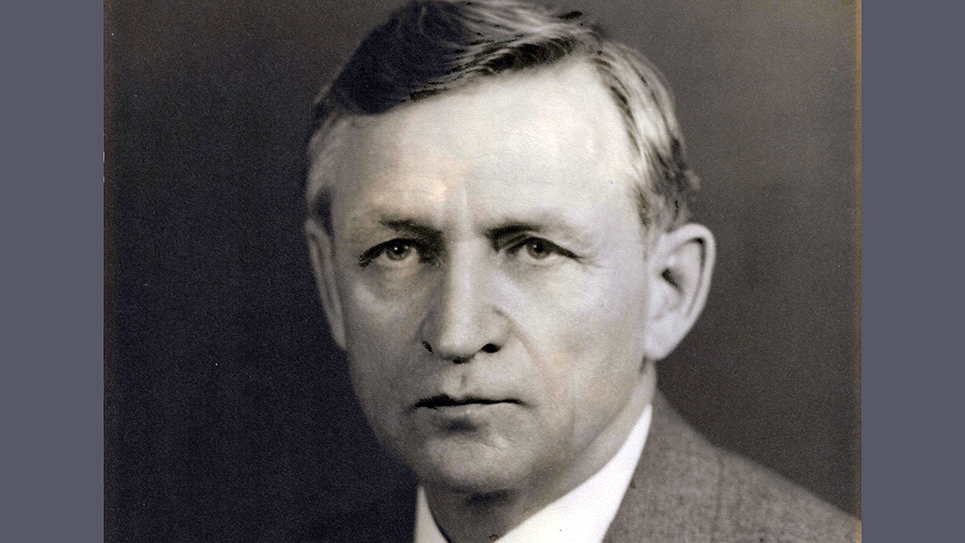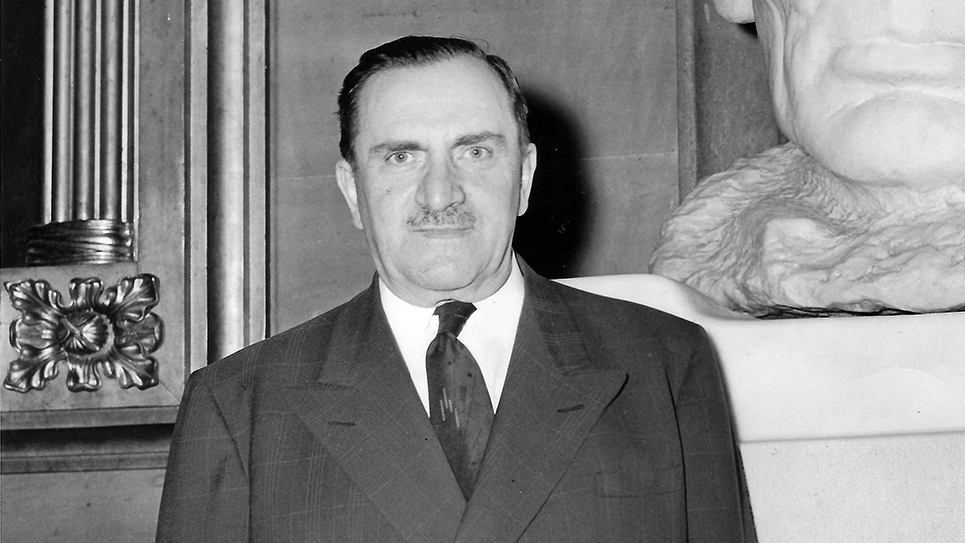For twenty-eight years, the Fourth Congressional District of Michigan was represented in Congress by Clare E. Hoffman. Known for his acerbic wit, Hoffman was oftentimes characterized as being cantankerous, but when he died, there were constant comments about how his speaking “entertained” the folks inside his district. Throughout his time in Congress, Clare Hoffman was unbeatable and only faced a couple of close elections in three decades of service.
Born the son of a blacksmith and wagon maker, Clare Hoffman’s sharp wit was always entertaining to at least a majority of his constituents and the congressman was an avid outdoorsman, enjoying hunting and fishing. Hoffman was also a conservationist who, concerned about the local diminishing population of deer, was instrumental in “reintroducing” deer to his hometown of Allegan. By the time the former congressman died, his home community enjoyed “a thriving herd.” A thorough-going and outspoken conservative made Clare Hoffman despised by much of the Left in the country. The epithets flung in the congressman’s direction were oftentimes vitriolic, but Clare Hoffman gave as good as he got. Perhaps the most frequent charge made against Congressman Clare Hoffman by his political opponents was that of obstructionist and ultra-conservative, especially for Hoffman’s usual insistence the taxpayers were being fleeced one way or another. Because of Hoffman’s obsession with economy in government, some grumbled he was “the congressman without pockets in his suits.” Prior to becoming Speaker, Democratic Majority Leader John McCormick once said he “had a minimum high regard for the Republican from Michigan.”
The sarcastic comments about Hoffman’s pockets were literally true. While a practicing trial attorney, Clare Hoffman quickly noticed some lawyers distracted members of juries by jingling the change in their pockets. Thereafter, Clare Hoffman had his suits made without pockets in the trousers.
Fellow Michigan congressman Gerald Ford, then serving as Minority Leader of the House of Representatives, recalled after the former representative’s death that Hoffman had never hesitated to oppose his own party’s leadership when he thought they were wrong. Ford acknowledged when Hoffman retired from the House “much of the spark and some of the fire disappeared from Capitol Hill when he left Congress.” Ford issued a statement when Clare Hoffman died, describing the late former congressman as “blunt, outspoken and colorful,” recalling Hoffman had earned a reputation as a feared opponent in debate precisely because of his barbed wit.
Despite his fearsome reputation in debate, the Michigan congressman was left speechless as he watched a parade of colleagues rise on the floor of the House of Representatives to offer tributes upon the occasion of his eighty-sixth birthday in 1961. When Hoffman’s friend and fellow arch-foe of spending, Congressman H. R. Gross of Iowa stood up and announced it was the Michiganlander’s birthday, Hoffman snatched up a newspaper and tried to appear disinterested in the House proceedings. Congressman Noah Mason of Illinois finally managed to engage Hoffman when he extended his “sympathy to Mrs. Hoffman for having put up with him for so many (62) years.” Clare Hoffman got up and joined in the applause. Still, it was Congressman Hoffman who brought the tributes to an end when he resorted to one of his favorite parliamentary devices by threatening to make a point of no quorum. Only one member of the House was older than Clare Hoffman; Kentucky’s Brent Spence was Hoffman’s senior by a few months.
One of Congressman Clare Hoffman’s favorite things to do was provoke a verbal free for all on the House floor or in committee and then walk away as the combatants chewed on each other. Emanuel Celler of New York and racist Congressman John E. Rankin of Mississippi were two of Hoffman’s favorite targets for provocation. Both Rankin and Celler were Democrats, but their political views were poles apart and neither liked the other.
The congressman “was proud of being called ornery” and his denunciation of Franklin Roosevelt’s New Deal, Harry Truman’s Fair Deal was fiery. Even the administration of moderate Republican Dwight D. Eisenhower did little to merit the approval of the peppery congressman from southwestern Michigan. During his years in Congress, Clare Hoffman voted against Social Security, price supports and foreign aid. Hoffman served on the House Education and Labor Committee where he could always be counted upon to be a fierce opponent of organized labor. Hoffman was also intensely proud of having helped to write portions of the Taft-Hartley Labor Bill. Hoffman delighted in having the shortest biographical sketch in the Congressional Directory.
As a congressman, Clare Hoffman never attended a cocktail party nor did he journey to foreign lands as a junketeer. Some friends laughed that Clare Hoffman “spent 28 years in Washington without changing his old habits… or his mind.”
Within five years of having first been elected to Congress, Clare Hoffman had so thoroughly angered congressional Democrats they tried to tie him to some mysterious “Fascist conspiracy” but all the congressman was guilty of was having spoken his own mind. As much as Democrats disliked his politics, Clare Hoffman returned that same dislike for their liberalism.
During the administration of President Dwight Eisenhower, Congressman Hoffman once explained, “I do not have so much to do with the passage of legislation desired by the administration as I do with defending some of the executive departments who are put on the hot seat by the Democratic committees.”
As colorful as he was controversial, Clare Hoffman remained well-liked by his people.
An avid reader of the Bible, Hoffman married Miss Florence Wason and they had two sons, both of whom became attorneys like their father. Muckraking national columnist Drew Pearson, who abhorred Hoffman’s politics, said he was sorry to see the congressman go when Hoffman retired from the House in 1962. “I for one am sorry,” Pearson said. “The congressman from Allegan is incorruptible, indefatigable, and scrupulous in watching the public purse. Whether you agreed with him or not he had the courage of his convictions and in these days of mass legislation that can be rare.”
The Saint Joseph, Michigan, Herald-Press posed the question in an editorial following Hoffman’s death in 1967, “. . .who is the most colorful politician with the biggest image among his constituency and the greatest loyalty from it on election days?” The editorial answered its own question, stating, “Clare Hoffman who died Friday night at age 92 stands like a skyscraper in the open prairie.”
Born in Vicksburg, Pennsylvania, Hoffman was a graduate of Northwestern Law School and was admitted to the Bar in 1896. That same year, Hoffman began practicing law in Allegan, Michigan, where he would spend the rest of his long life. Hoffman’s first bid for office occurred in 1900 when he sought to become Allegan County’s prosecuting attorney. It was the only race Clare Hoffman ever lost. In 1904, Clare Hoffman ran again and was elected the prosecuting attorney from Allegan County. Leaving office in 1910, Hoffman built up his law practice and was a successful trial attorney. Clare Hoffman was a local Republican chair when he became a candidate for the House of Representatives in 1934. The incumbent congressman was a Democrat, George Ernest Foulkes. Hoffman had to win the GOP primary in order to have the right to face Congressman Foulkes in the general election. Hoffman was one of four candidates running in the Republican primary.
Michigan’s Fourth Congressional District was comprised of six counties and was largely rural. Clare Hoffman was not surprisingly, a solid supporter of farmers while in Congress. Hoffman oftentimes made the dire prediction the farmers would “get their pitchforks and come to town” over some piece of legislation introduced by one of his colleagues in the House of Representatives. Once he arrived in Washington, D. C., Clare Hoffman announced he was in the Capitol for the “sole purpose of denouncing the New Deal” of President Franklin Roosevelt. Nor could one ignore the congressman from Michigan. Hoffman learned the rules and utilized them to his advantage. One was a little-known rule during the Roosevelt presidency where Congressman Clare Hoffman made a one-minute speech every day Congress was in session to decry some aspect of the New Deal.
Each of the GOP congressional candidates carried his own home base, but Clare Hoffman won three of the six counties. That was enough to give Hoffman just over 35% of the votes cast, beating his closest opponent by 1,361 ballots. The fifty-eight-year-old attorney campaigned hard in the general election and the Fourth District returned to its normally Republican roots. Hoffman won the general election with better than 58% of the vote against the incumbent.
After two years of service in Congress, Hoffman dispatched two opponents inside the GOP primary easily and faced the closest political contest of his career in the 1936 general election. Hoffman won with barely 50% of the vote and the rest was divided between three other candidates. Never again would Clare Hoffman’s share of the votes in Michigan’s Fourth Congressional District dip below 59%.
Once in Congress, Hoffman snapped President Roosevelt was little more than a “crazy, conceited megalomaniac.” Yet how did such a controversial figure remain so popular for so long? An editorial appearing in the Saint Joseph Herald-Press likely explained his enduring popularity with the people of Michigan’s Fourth Congressional District. The national media was dismayed at Clare Hoffman’s continued personal popularity inside a congressional district it thought was less conservative than its congressman. According to the Herald-Press, there were “a great many voters who felt personal admiration for a man who had the courage to row against the current” of political events. The editorial noted the people of the Fourth District knew the congressman “was utterly honest.” Hoffman never side-stepped issues, telling CIO rallies his beliefs. The Herald-Press noted that organized labor members always booed Hoffman’s statements, “but cheered him when he walked out of their hall.” Clare Hoffman never retreated to the politician’s usual device of claiming he had been misquoted when one of his statements was criticized or proved to be controversial or unpopular. Lastly and perhaps most importantly, as a congressman, Clare Hoffman was well known to “turn Heaven and earth to help a constituent find his way through the maze of government bureaucracies, regardless of the constituent’s politics.” The Herald-Press recalled the congressman “went to bat for his people with a vengeance; and even hostile bureaucrats jumped rather than risk his scathing exposure.” Another factor that ensured his continued political success was in private and his relations with other folks Clare Hoffman was a very charming man. Such a tribute was paid to Hoffman by Congressman Barrett O’Hara, a Chicago Democrat, who said, “More often than not Clare and I have been on different sides of issues (but) I have never known a kinder heart.”
The Herald-Press noted that was the side most of the people in Michigan’s Fourth Congressional District saw “when he hunted or fished with dirt farmers, when he took extra hours to explain a complicated subject to a cub reporter, when he jollied a hard-working housewife in some remote hamlet, when he drove his small Plymouth down country roads to visit an ailing friend.” Clare Hoffman cared and had mastered the art of the personal touch.
Clare Hoffman might very well have continued running had he not been felled by a serious stroke in November of 1961 at age eighty-six. Although described at the time as a “light” stroke and the congressman’s physician claimed his patient was “doing very good,” Congressman Hoffman’s public schedule was curtailed because of his illness and he left Congress in 1963. The former congressman lamented his inability to campaign for 1964 GOP presidential nominee Barry Goldwater. Although increasingly feeble, Hoffman continued to closely follow politics and political developments in the country.
Clare Hoffman continued to age, and he was plagued by additional strokes, cardiac trouble and finally, pneumonia. It took all those misfortunes to extinguish the spark of life that burned inside Clare Hoffman.







